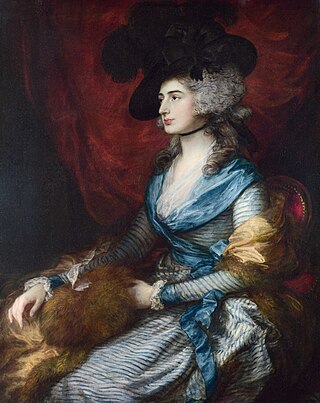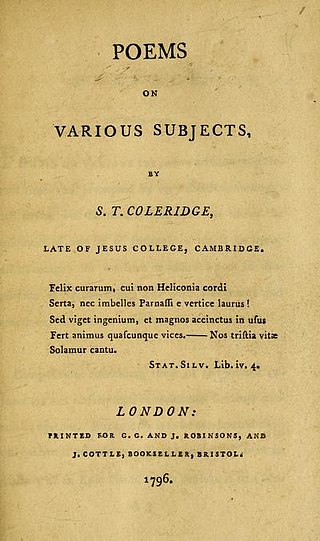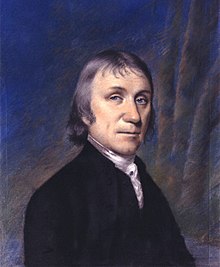Samuel Taylor Coleridge was born on 21 October 1772. The youngest of 14 children, he was educated after his father's death and excelled in classics. He attended Christ's Hospital and Jesus College, Cambridge. While attending college, he befriended two other Romanticists, Charles Lamb and Robert Southey, the latter causing him to eventually drop out of college and pursue both poetic and political ambitions.
"Pain: Composed in Sickness" is a poem by Samuel Taylor Coleridge. The poem marks a time in Coleridge's life in which he began to take opium.
On Receiving an Account that his only Sister's Death was Inevitable was composed by Samuel Taylor Coleridge in 1794, and deals with the death of Coleridge's step-sister Ann (1791), as well as that of his brother Luke (1790). A later poem, was written for Coleridge's friend Charles Lamb and seeks to comfort him after the loss of his sister.
The Destiny of Nations was composed by Samuel Taylor Coleridge as part of Robert Southey's Joan of Arc epic poem. The lines were later isolated from Southey's and expanded. The new poem includes Coleridge's feelings on politics, religion, and humanity's duty to helping each other.
"On Quitting School" is a sonnet written by Samuel Taylor Coleridge in 1791. It describes Coleridge's feelings of leaving school for Cambridge in an optimistic manner quite contrary to the views he expressed later in life.
The Eolian Harp is a poem written by Samuel Taylor Coleridge in 1795 and published in his 1796 poetry collection. It is one of the early conversation poems and discusses Coleridge's anticipation of a marriage with Sara Fricker along with the pleasure of conjugal love. However, The Eolian Harp is not a love poem and instead focuses on man's relationship with nature. The central images of the poem is an Aeolian harp, an item that represents both order and wildness in nature. Along with the harp is a series of oppositional ideas that are reconciled with each other. The Eolian Harp also contains a discussion on "One Life", Coleridge's idea that humanity and nature are united along with his desire to try to find the divine within nature. The poem was well received for both its discussion of nature and its aesthetic qualities.
Frost at Midnight is a poem by Samuel Taylor Coleridge, written in February 1798. Part of the conversation poems, the poem discusses Coleridge's childhood experience in a negative manner and emphasizes the need to be raised in the countryside. The poem expresses hope that Coleridge's son, Hartley, would be able to experience a childhood that his father could not and become a true "child of nature". The view of nature within the poem has a strong Christian element in that Coleridge believed that nature represents a physical presence of God's word and that the poem is steeped in Coleridge's understanding of Neoplatonism. Frost at Midnight has been well received by critics, and is seen as the best of the conversation poems.
Sonnets on Eminent Characters or Sonnets on Eminent Contemporaries is an 11-part sonnet series created by Samuel Taylor Coleridge and printed in the Morning Chronicle between 1 December 1794 and 31 January 1795. Although Coleridge promised to have at least 16 poems within the series, only one addition poem, "To Lord Stanhope", was published.

"To Erskine" or "To the Hon Mr Erskine" was written by Samuel Taylor Coleridge in November 1794. The subject of the poem is Thomas Erskine, a lawyer and member of the Whig party, who successfully served in the defense of three political radicals during the 1794 Treason Trials. Coleridge admired Erskine's defense and praised his refusal to accept money for his service. The poem was published in the 1 December 1794 Morning Chronicle as part of the Sonnets on Eminent Characters series. It was later included in various collections of Coleridge's poetry published later.

"To Burke" is a sonnet by Samuel Taylor Coleridge first published in the 9 December 1794 Morning Chronicle. Unlike most of the Sonnets on Eminent Characters, "To Burke" describes a person whom Coleridge disagreed with; he felt Edmund Burke abused the idea of freedom within various speeches and turned his back on liberty.

"To Fayette" was written by Samuel Taylor Coleridge and published in the 26 December 1794 Morning Chronicle as part of the Sonnets on Eminent Characters series. Coleridge, like other Romantic poets, viewed Gilbert du Motier, marquis de Lafayette as a hero of liberty for his part in the American and French revolutions. The poem coincides with Fayette's imprisonment in Austria, and he is treated as a martyr for liberty. The language Coleridge uses within the poem to describe Fayette and revolutions appears in many of his later works.

"To Kosciusko" is the name shared by three sonnets written by Samuel Taylor Coleridge, Leigh Hunt, and John Keats. Coleridge's, the original, was written in December 1794 and published in the 16 December 1794 Morning Chronicle as the fifth of his Sonnets on Eminent Characters series. Hunt and Keats were inspired to follow his poem with their own versions in November 1815 and December 1816, respectively. The sonnets were dedicated to heroism of Tadeusz Kościuszko, leader of the 1794 Polish rebellion against Prussian and Russian control.

"To Pitt" is a political poem written by Samuel Taylor Coleridge and published in the 26 December 1794 Morning Chronicle as part of the Sonnets on Eminent Characters series. Describing William Pitt the Younger and his role as Prime Minister of Great Britain, the poem is one of the few in the series that is not about a hero of Coleridge. Instead, Pitt is described as Judas, the betrayer of Christ, because of, among other issues, his treatment of political dissidents.
"To Bowles" was written by Samuel Taylor Coleridge and published in the 26 December 1794 Morning Chronicle as part of the Sonnets on Eminent Characters series. William Lisle Bowles's poetry was introduced to Coleridge in 1789 and Bowles had an immediate impact on Coleridge's views of poetry. The sonnet celebrates Bowles's status as a poet. It also discusses Bowles's political beliefs, which helped shape Coleridge's ideas on government and politics.

"To Mrs Siddons" was written by Samuel Taylor Coleridge and published in the 29 December 1794 Morning Chronicle as part of the Sonnets on Eminent Characters series. It describes Sarah Siddons, an actress Coleridge became fond of during his visits to London during college. The poem celebrates watching Siddons perform her various roles on stage. The actual authorship of the poem is uncertain, since it was attributed to Charles Lamb in various works. It is possible that Lamb and Coleridge worked on the poem together, and, if so, it would be one of Lamb's earliest works.

"To Godwin" or "To William Godwin" was written by Samuel Taylor Coleridge and published in the 10 January 1795 Morning Chronicle as part of the Sonnets on Eminent Characters series. William Godwin was admired by Coleridge for his political beliefs. However, Coleridge did not support Godwin's atheistic views, which caused tension between the two. Although the poem praises Godwin, it invokes an argument that the two shared over theological matters. After the poem was written, the relationship between Coleridge and Godwin cooled and the poem was not reprinted.

"To Southey" or "To Robert Southey" was written by Samuel Taylor Coleridge and published in the 14 January 1795 Morning Chronicle as part of his Sonnets on Eminent Characters series. Robert Southey became a close friend of Coleridge during the summer of 1794 and the two originally formed a plan to start an ideal community together. Although the plan fell apart, Coleridge dedicated the poem to his friend and emphasized Southey's poetic abilities. Following the poem, Coleridge further drifted from Southey and the poem was not republished.

"To Sheridan" or "To Richard Brinsley Sheridan" was written by Samuel Taylor Coleridge and published in the 29 January 1795 Morning Chronicle. As the last poem running as part of the Sonnets on Eminent Characters series, it describes Coleridge's appreciation of Richard Brinsley Sheridan and his theatre talents. Coleridge, unlike most, preferred Sheridan's somber works over his comedies and emphasizes them within the poem. Coleridge also respects Sheridan's political actions.

"To Lord Stanhope" is a poem written by Samuel Taylor Coleridge. It was published in his 1796 collection of poems. The subject, Charles Stanhope, 3rd Earl Stanhope, had originally shared political views with Coleridge, but as time passed, Coleridge's views gradually shifted. By 1803, Coleridge was claiming that he did not want the poem published anymore and that it was originally intended to mock those who held the beliefs which Coleridge had held years earlier. It is part of the Sonnets on Eminent Characters series, although it was not published in the Morning Chronicle unlike the others in the series. There is, however, a possible predecessor sonnet to the 1796 version that some editors have attributed to Coleridge.

Poems on Various Subjects (1796) was the first collection by Samuel Taylor Coleridge, including also a few sonnets by Charles Lamb. A second edition in 1797 added many more poems by Lamb and by Charles Lloyd, and a third edition appeared in 1803 with Coleridge's works only. All three editions included poems in Coleridge's early Miltonic style, such as his Religious Musings and Monody on the Death of Chatterton, alongside lyrics and some of his first conversation poems, such as The Eolian Harp, in a style suggested by the works of William Cowper. The book was on the whole well received by reviewers; modern critics value it more for its shorter and lighter poems than for its formal set-pieces.












